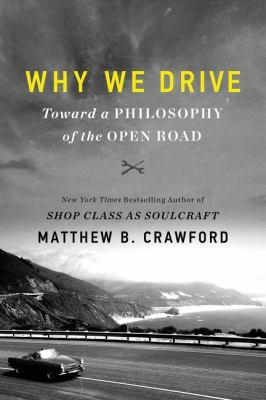
Why we drive : toward a philosophy of the open road
Once we were drivers, the open road alive with autonomy, adventure, danger, trust, and speed. Today we are as likely to be in the back seat of an Uber as behind the wheel ourselves. Tech giants are hurling us toward a shiny, happy "self-driving" future, selling utopia but equally keen to advertise to a captive audience strapped into another expensive device. Are we destined, then, to become passengers, not drivers? Why We Drive reveals that much more may be at stake than we might think.
Available Copies by Location
| Location | |
|---|---|
| Victoria | Available |
Browse Related Items
- ISBN: 9780062741967
- Physical Description 360 pages : illustrations ; 24 cm
- Edition First edition.
- Publisher [Place of publication not identified] : [publisher not identified], 2020.
Content descriptions
| Bibliography, etc. Note: | Includes bibliographical references and index. |
Additional Information

Kirkus Review
Why We Drive : Toward a Philosophy of the Open Road
Kirkus Reviews
Copyright (c) Kirkus Reviews, used with permission.
A philosopher stakes his claim to freedom and the open road. What do driving cars and riding motorcycles have to do with philosophy? Quite a bit, it seems, at least when Crawford is steering the discussion. As in his previous books, Shop Class as Soulcraft and The World Beyond Your Head, the author brings an easy and wide-ranging erudition to his subject--in this case, our relationships to our vehicles. The book might have been titled In Defense of Driving. Despite his mostly sober prose, Crawford's "critical, humanistic inquiry" is ultimately a passionate appeal to the importance of the autonomous individual in the face of the dehumanizing pressure of automation. Driverless cars meet a worthy opponent in Crawford, who elegantly dissuades us from a future in which "the world becomes a techno-zoo for defeated people, like the glassy-eyed creatures in WALL-E, or like the lab rats who are raised in Plexiglas enclosures." No matter how many lives you think could be saved by removing imperfect humans from the driving equation or how tempting you find it to turn your commute into more time looking at your phone, this book will have you pining for the freedom the open road has always represented. Crawford can get carried away, as in a too-detailed account (with diagrams) of rebuilding a Volkswagen engine, but his delight in his subject makes for an enjoyable reading experience even for the non-enthusiast. The text is yet more evidence for Crawford's argument, now extending over three books, that paying attention to and placing ourselves in the material world brings a certain satisfaction that we neglect at our peril. Employing memoir, journalism, cultural criticism, and political philosophy--and never shying away from the contentious ("An Ode to Redneck Women")--the author makes being human seem worthwhile. Even if Crawford is fighting a losing battle, he fights it valiantly, even heroically. Copyright (c) Kirkus Reviews, used with permission.


